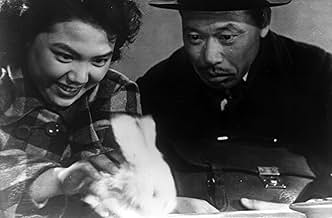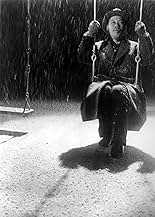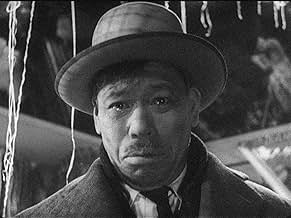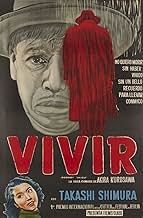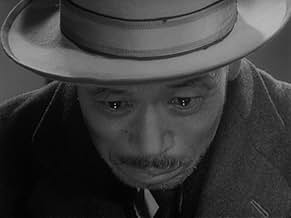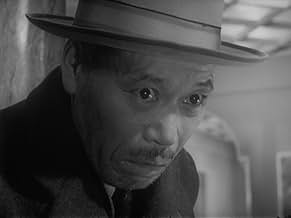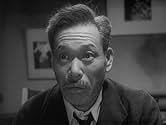Un bureaucrate essaie de trouver un sens à sa vie suite à la découverte qu'il a un cancer en phase terminale.Un bureaucrate essaie de trouver un sens à sa vie suite à la découverte qu'il a un cancer en phase terminale.Un bureaucrate essaie de trouver un sens à sa vie suite à la découverte qu'il a un cancer en phase terminale.
- Réalisation
- Scénario
- Casting principal
- Nomination aux 1 BAFTA Award
- 6 victoires et 2 nominations au total
Avis à la une
"Ikiru" is supposedly one of Steven Spielberg's favourite films, and one can see the influence it's had on him not only in the sentimentality and the ultimate "feelgood factor" (which may be a little too extreme for some viewers, although the script never condescends), but visually, especially in the virtuoso sequence in which a reprobate leads our hero, a respectable and dull civil servant, on a whirlwind tour of Tokyo's frenzied nightlife - a masterpiece of camera placement and editing. With images throughout that will stay with you for a long time, and a terrific supporting performance by Miki Odagiri as a vivacious young "office lady", "Ikiru" is still an absolute knockout more than 50 years on.
Probably one of the most difficult aspects a film like "Ikiru" has to overcome is the very rough march of time. To actually find someone these days, let's say a crowd of regular movie-goers to sit down and watch a film about an old Japanese man dying of cancer would be too much to ask.
Long held shots, hardly uplifting subject, to westerners very foreign. An array of reasons not to see it. And yet, once you actually start getting into the picture it doesn't let you go. Which is why it may be rightfully considered to be a classic.
Of all of Kurosawa's films this is probably the one movie that works perfectly on a universal level. Because at its core it is about one of the most basic desires of human existence...namely to be able to look back on your life and say "It was worth it."
In its starch and unforgiving black-and-white form the movie records the time of one man's life in such a beautiful and yes, colorful way, that by the time the final moments of the film play out, it will be very hard for anybody not to be touched. A glorious moment in 20th century cinema, that will hopefully be preserved for decades to come.
Long held shots, hardly uplifting subject, to westerners very foreign. An array of reasons not to see it. And yet, once you actually start getting into the picture it doesn't let you go. Which is why it may be rightfully considered to be a classic.
Of all of Kurosawa's films this is probably the one movie that works perfectly on a universal level. Because at its core it is about one of the most basic desires of human existence...namely to be able to look back on your life and say "It was worth it."
In its starch and unforgiving black-and-white form the movie records the time of one man's life in such a beautiful and yes, colorful way, that by the time the final moments of the film play out, it will be very hard for anybody not to be touched. A glorious moment in 20th century cinema, that will hopefully be preserved for decades to come.
Ikiru is a film about life. Constantly complex and thought-provoking, although simple at the same time; it tells a story about life's limits, how we perceive life and the fact that life is short and not to be wasted. Our hero is Kanji Watanabe, the most unlikely 'hero' of all time. He works in a dreary city office, where nothing happens and it's all very meaningless. Watanabe is particularly boring, which has lead to him being nicknamed 'The Mummy' by a fellow worker. He later learns that he is dying from stomach cancer and that he only has six months to live. But Watanabe has been dead for thirty years, and now that he's learned that his life has a limit; it's time for Watanabe to escape his dreary life and finally start living. What follows is probably the most thoughtful analysis of life ever filmed.
Ikiru marks a departure for Akira Kurosawa, a man better known for his samurai films, but it's a welcome departure in my opinion. Kurosawa constantly refers to Watanabe as 'our hero' throughout the film, and at first this struck me as rather odd because, as I've mentioned, he's probably the least likely hero that Kurosawa has ever directed; but that's just it! This man is not a superhero samurai, but rather an ordinary guy that decides he doesn't want to be useless anymore. That's why he's 'our hero'. Kurosawa makes us feel for the character every moment he's on screen - we're sorry that he's wasted his life, and we're sorry that his wasted life is about to be cruelly cut short. However, despite the bleak and miserable facade that this movie gives out, there is a distinct beauty about it that shines through. The beauty emits from the way that Watanabe tries to redeem his life; because we feel for him and are with him every step of the way, it's easy to see why Watanabe acts in the way he does. Ikiru is a psychologically beautiful film.
It could be said that the fantastic first hour and a half is let down by a more politically based final third - and this is true. The movie needs it's final third in order to finish telling the story, but it really doesn't work as well as the earlier parts did. However, Kurosawa still delights us with some brilliant imagery and the shot of Watanabe on a swing is the most poetically brilliant thing that Kurosawa ever filmed. Together with the music and the rest of the film that you've seen so far; that picture that Kurosawa gives us is as moving as it is brilliant.
Ikiru marks a departure for Akira Kurosawa, a man better known for his samurai films, but it's a welcome departure in my opinion. Kurosawa constantly refers to Watanabe as 'our hero' throughout the film, and at first this struck me as rather odd because, as I've mentioned, he's probably the least likely hero that Kurosawa has ever directed; but that's just it! This man is not a superhero samurai, but rather an ordinary guy that decides he doesn't want to be useless anymore. That's why he's 'our hero'. Kurosawa makes us feel for the character every moment he's on screen - we're sorry that he's wasted his life, and we're sorry that his wasted life is about to be cruelly cut short. However, despite the bleak and miserable facade that this movie gives out, there is a distinct beauty about it that shines through. The beauty emits from the way that Watanabe tries to redeem his life; because we feel for him and are with him every step of the way, it's easy to see why Watanabe acts in the way he does. Ikiru is a psychologically beautiful film.
It could be said that the fantastic first hour and a half is let down by a more politically based final third - and this is true. The movie needs it's final third in order to finish telling the story, but it really doesn't work as well as the earlier parts did. However, Kurosawa still delights us with some brilliant imagery and the shot of Watanabe on a swing is the most poetically brilliant thing that Kurosawa ever filmed. Together with the music and the rest of the film that you've seen so far; that picture that Kurosawa gives us is as moving as it is brilliant.
Akira Kurosawa knew how to get in touch with human nature through his art. With his visual expressiveness and storytelling, he could pierce through his subjects, even in his big and occasionally comical samurai films, and find the elemental things do work. What he probably learned off of Rashomon probably helped out with Ikiru (To Live), a story of an old man who finds out he will die within a year, as both stories deal with perceptions of the significance of a life spent and a life wasted. Though that was to a different degree in Rashomon, with Ikiru Kurosawa expands into full-on existentialism.
The old man Kanji Watanabe (in a wholly believable and often heart-breaking performance by Takashi Shimura) knows his life hasn't amounted to much as a (chief) clerk for the city. He knows he hasn't had a great kinship with his son. He's accepting his fate with a heavy soul. One of the tenets of existentialism is that there's free-will, and the responsibility to accept what is done with one's life. Kurosawa might've (as I speculate, I don't entirely know) caught onto this for his lead, and it works, especially with the little details.
Such little details, unforgettable ones, have been expounded upon by other reviewers and critics, such as the drunken, sullen singing of "Life is short, fall in love my maiden" in the bar. A scene like that almost speaks for itself and yet it's also subtle. But one scene that had me was one not too many talk about. It's when Watanabe is in the Deputy Mayor's office, asking for permission so that a park can be built. At first the Mayor ignores him, but then Watanabe begs, but not in a way that manipulates the audience for sympathy with the old man. The mayor must be sensing something in his eyes, desperate and weak, however determined, and it's something that probably most of the audience can identify with as well, even if they don't entirely identify with the character.
But aside from the emotional impact Ikiru can have on a viewer, composition-wise (with the help of Asakazu Nakai, wonderful cinematographer on less than a dozen Kurosawa films) and editing-wise the film is ahead of its time and another example of Kurosawa's intuitive eye. There are some to-tomy shots sometimes (which could be called typical via master Ozu or other), but everything appears so precise on a first viewing, so descriptive. I think I almost can't go into all of them without a repeat viewing, but there were two that are still fresh in me. The first was right as Watanabe was about to sing in the bar, and there were these bead-strings looming in front of the camera. Perhaps mysterious, but definitely evocative.
The other was when Watanabe and one of the other clerks are on a bridge during a dark part of the day. Both characters are in silhouette, and Watanabe gives an indication to the character that he will die soon. But for me, I wasn't even paying a terrible amount of attention to the words. The way the two are lit as they are, with the light in the background and darkness in the foreground, it could maybe give an indication of what Kurosawa's trying to say: we're all not in the light of life, but it doesn't have to be an entire down-ward spiral if the will is good. Whether you're into philosophy (ies) or not, Ikiru won't disappoint newcomers to Kurosawa via his action pictures. A+
The old man Kanji Watanabe (in a wholly believable and often heart-breaking performance by Takashi Shimura) knows his life hasn't amounted to much as a (chief) clerk for the city. He knows he hasn't had a great kinship with his son. He's accepting his fate with a heavy soul. One of the tenets of existentialism is that there's free-will, and the responsibility to accept what is done with one's life. Kurosawa might've (as I speculate, I don't entirely know) caught onto this for his lead, and it works, especially with the little details.
Such little details, unforgettable ones, have been expounded upon by other reviewers and critics, such as the drunken, sullen singing of "Life is short, fall in love my maiden" in the bar. A scene like that almost speaks for itself and yet it's also subtle. But one scene that had me was one not too many talk about. It's when Watanabe is in the Deputy Mayor's office, asking for permission so that a park can be built. At first the Mayor ignores him, but then Watanabe begs, but not in a way that manipulates the audience for sympathy with the old man. The mayor must be sensing something in his eyes, desperate and weak, however determined, and it's something that probably most of the audience can identify with as well, even if they don't entirely identify with the character.
But aside from the emotional impact Ikiru can have on a viewer, composition-wise (with the help of Asakazu Nakai, wonderful cinematographer on less than a dozen Kurosawa films) and editing-wise the film is ahead of its time and another example of Kurosawa's intuitive eye. There are some to-tomy shots sometimes (which could be called typical via master Ozu or other), but everything appears so precise on a first viewing, so descriptive. I think I almost can't go into all of them without a repeat viewing, but there were two that are still fresh in me. The first was right as Watanabe was about to sing in the bar, and there were these bead-strings looming in front of the camera. Perhaps mysterious, but definitely evocative.
The other was when Watanabe and one of the other clerks are on a bridge during a dark part of the day. Both characters are in silhouette, and Watanabe gives an indication to the character that he will die soon. But for me, I wasn't even paying a terrible amount of attention to the words. The way the two are lit as they are, with the light in the background and darkness in the foreground, it could maybe give an indication of what Kurosawa's trying to say: we're all not in the light of life, but it doesn't have to be an entire down-ward spiral if the will is good. Whether you're into philosophy (ies) or not, Ikiru won't disappoint newcomers to Kurosawa via his action pictures. A+
Kanji Watanabe discovers that he has cancer, and tries to seek some sort of meaning in his final days, he becomes aware that he's operated as a cog in the giant domestic machinery, and fights against the system.
I've been working my way through The Kurosawa films, and thus far I've been impressed with the lot, I'll be honest, I expected a Samurai film, and when it became apparent that that wasn't the case either, I thought it may have been a mystery, it wasn't that either, instead it turned out to be a rather intimate, absorbing character study.
It shows that despite being essentially part of a machine, Kanji has a very human side, only he realises it too late.
This film moved me to tears on occasion, it had me laughing, it certainly had be captivated for the whole running time. That moment where Kanji explains what's happening to his son, it was phenomenal.
I am learning more about Kurosawa with each film I watch, but I must admit, this one threw me totally off guard, it wasn't what I was expecting, it further enhances my realisation that Kurosawa was a genius.
Remember all work and no play! There's a really meaningful message in this film.
9/10.
I've been working my way through The Kurosawa films, and thus far I've been impressed with the lot, I'll be honest, I expected a Samurai film, and when it became apparent that that wasn't the case either, I thought it may have been a mystery, it wasn't that either, instead it turned out to be a rather intimate, absorbing character study.
It shows that despite being essentially part of a machine, Kanji has a very human side, only he realises it too late.
This film moved me to tears on occasion, it had me laughing, it certainly had be captivated for the whole running time. That moment where Kanji explains what's happening to his son, it was phenomenal.
I am learning more about Kurosawa with each film I watch, but I must admit, this one threw me totally off guard, it wasn't what I was expecting, it further enhances my realisation that Kurosawa was a genius.
Remember all work and no play! There's a really meaningful message in this film.
9/10.
Le saviez-vous
- AnecdotesWhen Takashi Shimura rehearsed his singing of "Song of the Gondola," director Akira Kurosawa instructed him to "sing the song as if you are a stranger in a world where nobody believes you exist."
- GaffesWhen Kanji and the Novelist go to a busy, loud nightclub, the film has been reversed as evidenced by the backwards "Nippon Beer" banner in the background.
- ConnexionsFeatured in The Siskel & Ebert 500th Anniversary Special (1989)
- Bandes originalesJ'ai Deux Amours
(uncredited)
Music by Vincent Scotto
Lyrics by Georges Koger and Henri Varna
Performed by Josephine Baker
[Played when entering the bar with the long-faced man]
Meilleurs choix
Connectez-vous pour évaluer et suivre la liste de favoris afin de recevoir des recommandations personnalisées
Détails
Box-office
- Montant brut aux États-Unis et au Canada
- 60 239 $US
- Week-end de sortie aux États-Unis et au Canada
- 2 149 $US
- 29 déc. 2002
- Montant brut mondial
- 114 026 $US
- Durée
- 2h 23min(143 min)
- Couleur
- Mixage
- Rapport de forme
- 1.37 : 1
Contribuer à cette page
Suggérer une modification ou ajouter du contenu manquant

![Regarder Trailer [OV]](https://m.media-amazon.com/images/M/MV5BMTg4OWJkNjMtM2Y0Mi00MzQ5LTk3Y2YtZWMwNGUyOTIyNGVjXkEyXkFqcGdeQXRyYW5zY29kZS13b3JrZmxvdw@@._V1_QL75_UX500_CR0)
